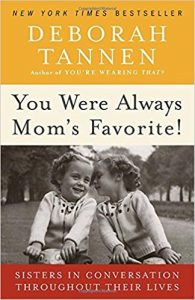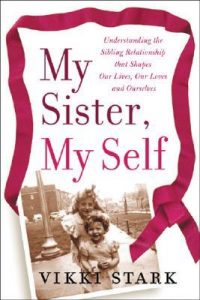I recently wrote about birth order effects on personality, self-concept, and behavior. At the time, I made no distinctions based on the gender of the siblings. But last Sunday was Sister’s Day, so let’s take a look at female siblings in particular.

I’ve written before about Deborah Tannen, a world-renowned linguist who’s written—among other works—bestsellers about communication patterns between women and men, in the workplace, and between mothers and daughters. Now Tannen (the youngest of three sisters) has written You Were Always Mom’s Favorite! Sisters in Conversation Throughout Their Lives.
Tannen reveals that in some ways, she’ll always feel like the kid sister. She claims that just as mother/daughter relationships are particularly fraught because both are women, so are the relationships of sisters. It is a relationship of connection and competition. Every child wants attention and resources.
Age differences are a built-in power differential that lasts forever. Whether the siblings are 4 and 6 or 101 and 103, the older is always older.
And comparisons are inevitable. When sisters are asked to describe themselves and their sisters, whether they get along or don’t, they almost always talk about being “very different.”
Twins are no exception. They often feel that people are trying to differentiate them as the smart one, the more outgoing one, the more studious one, the more athletic one, etc.

Vikki Stark, author of My Sister, My Self: The Surprising Ways that Being an Older, Middle, Younger or Twin Shaped Your Life , focuses specifically on birth order among sisters. She maintains—and presents evidence—that birth order among sisters affects occupation, love relationships, friendships, and how one feels about her body.
This book is by a social worker, and includes a lot of techniques and strategies to help readers who want to break out of limiting sisters roles or improve sister relationships.
You can also go online and read articles like “Why the Sister-Sister Relationship Is Always Love-Hate” by Alicia Prince or “Sisters: love and rivalry” by Terri Apter or “Why The Sister-Sister Relationship Might Be The Hardest One of All” by Rebecca Seed.
If you are a female writer with one or more sisters, these readings might be personally interesting as well as helpful in recognizing sister relationships that are unlike your own experience. Why would a man want to read this stuff? Besides general interest in understanding human nature, one’s own wife, or daughters, if you are a writer, you will be better able to write female characters!